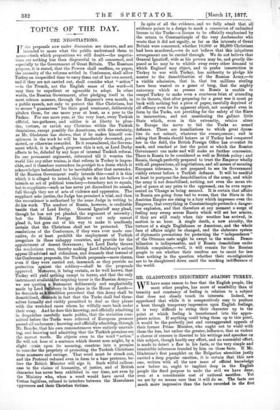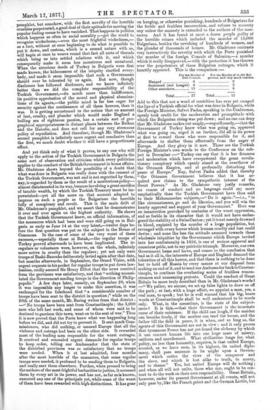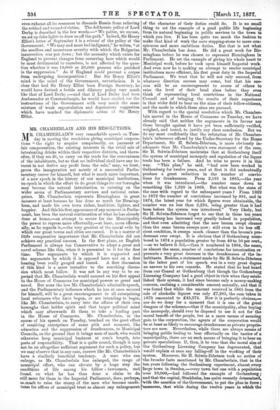MR. GLADSTONE'S INDICTMENT AGAINST TURKEY.
WE have some reason to fear that the English people, like most other peoples, has more of sensibility than of tenacity and constancy of feeling in relation to a subject that does not closely touch its interests. Indeed, we apprehend that while it is comparatively easy to produce a keen though temporary impression upon English feelings, it is very difficult to string their character up to the point at which feeling is transformed into the appro- priate action. If anything could bring them up to this point, it would be the perfectly just and unexaggerated appeals of their former Prime Minister, who ought not to wield with them the less, but rather the greater, influence, that so violent a chorus of censure is directed to his writings and speeches on this subject, though hardly any effort, and no successful effort, is made to detect a flaw in his facts, or the very simple and irresistible inferences founded by him on those facts. If Mr. Gladstone's first pamphlet on the Bulgarian atrocities justly excited a deep popular emotion, it is certain that this new one, written with all the new mass of official knowledge now before us, ought to implant deep in the English people the fixed purpose to undo the evil we have done, even at a considerable cost of national sacrifice. Yet we are by no means sure that it will do so. The facts are much more impressive than the facts recorded in the first • pamphlet, but somehow, with the first novelty of the horrible on hanging, or otherwise punishing, hundreds of Bulgarians for cruelties perpetrated, a good deal of their aptitude for moving the I the feeble and fruitless insurrection, and refuses to amnesty popular feeling seems to have vanished. That happens in politics , any unless the amnesty is extended to the authors of the mas- which happens so often in social morality ;—get the world to ' sacres. And it has found at most a dozen people guilty of
recognise wickednee.s,—even the most frightful wickedness,— as a fact, without at once beginning to do what is possible to put it down, and custom, which is a second nature with us, will begin at once to weave round that fact all sorts of threads which bring us into settled relations with it, and which consequently make it seem less monstrous and unnatural When the atrocious deeds of Turkey in Bulgaria were first made known the hideousness of the iniquity startled every-
body, and made it seem impossible that such a Government
should ever be tolerated by us again. But now, though disclosure has followed disclosure, and we know infinitely better than we did the complete responsibility of the Turkish Government,—its much more than indifference, its positive approbation of the moral and physical abomina- tions of its agents,—the public mind is far less eager for security against the continuance of all these horrors, than it was. It is getting accustomed to the notion that an amount of lust, cruelty, and plunder which would make England a boiling sea of righteous passion, has a certain sort of geo- graphical appropriateness in distant places between the Balkan and the Danube, and does not call for any very strenuous policy of repudiation. And therefore, though Mr. Gladstone's second pamphlet is infinitely more cogent and conclusive than the first, we much doubt whether it will have a proportionate effect.
And yet think only of what it proves, to any one who will apply to the action of the Turkish Government in Bulgaria the same sort of observation and criticism which every politician applies to the conduct of the British Government in home affairs. Mr. Gladstone shows beyond the possibility of a doubt that what was done in Bulgaria was really done with the consent of the Turkish Government, was not and is not regretted by them, nay, is regarded by them as the result of a meritorious policy— almost disinterested in its way, because involving a great sacrifice of taxable wealth, by which the Turkish Treasury must be im- poverished—yet all the more on that account adapted to impress on such a people as the Bulgarians the horrible folly of conspiracy and revolt. This is the main drift of Mr. Gladstone's pamphlet, and we assert that he demonstrates it over and over again on the highest authority. He shows that the Turkish Government knew, on official information, of the massacres which had been and were still going on in Bul- garia as early as June 14 at the very latest,—twelve days be- fore the first question was put on the subject in the House of Commons. In the case of some of the very worst of these excesses,—especially those at Batak,—the regular troops of Turkey proved afterwards to have been implicated. The ir- regulars or volunteers were, however, on the whole, infinitely more active in cruelty than the regulars ; yet not only were troops of Bashi-13azouks deliberately levied again after that date, but months afterwards, in September, the Grand Vizier, with urgent requests in his pocket for regular troops to put down law- lessless, coolly assured Sir Henry Elliot that the news received from the provinces was satisfactory, and that "nothing necessi- tated the Government sending troops in the direction of Philip- popolis." A few days later, namely, on September 20, when it was impossible any longer to make this assertion, it was exchanged for the falsehood that "a considerable number of troops have been sent to the district in question ;" while on the 26th of the same month, Mr. Baring writes from that district : —" No troops have been sent from Constantinople ; the 3,000 men who left last week, and some of whom were said to be destined to garrison this town, went on to the seat of wax." Thus it is now proved that the Porte knew what was happening long before we did, and did not try to prevent it. It sent mock Com- missioners, who did nothing, or assured Europe that all the violence and outrage had been on the other side. It rewarded most of the leading men responsible for the worst outrages. It received and concealed urgent demands for regular troops to keep order, telling our Ambassador that the state of the distilrbed provinces was so satisfactory that no troops were needed. When it at last admitted, four months after the most horrible of the massacres, that some regular troops were needed, it professed to be sending them to Bulgaria, and really sent them elsewhere. Further, when pressed to bring the authors of the most frightful barbarities to justice, it screened them by every art in its power, and has not, as far as is known, executed any one of the principals yet, while some of the worst of them have been rewarded with high distinctions. It has gone the horrible crimes which included the murder of 15,000 Bulgarians, besides the ravishing of hundreds of women, and the plunder of thousands of homes. Mr. Gladstone contrasts very instructively the severity with which the Porte punished the murder of the foreign Consuls of Salonica,—a murder which it really disapproved,—with the protection it has thrown over the perpetrators of these Bulgarian outrages, which it heartily approved. This is the comparison :-
For the Murder of For the Murder or 15,000 But-
Two Consuls. gariane, and very much besides.
Hanged 6 2 Sentenced (not hanged) 6 2 Other sentences 15 8 Total 27 Total 12
Add to this that not a word of contrition has ever yet escaped the lips of a Turkish official for what was done in Bulgaria, while the Foreign Minister, Saf vet Pasha, speaking in the Conference, openly took credit for the moderation and promptitude with which the Bulgarian rising was put down ; and no one can deny that Mr. Gladstone makes out amply,—superfluously,—that the Government of Turkey knew what was going on, approved what was going on, urged it on further, did all in its power at first to reward those who were responsible for it, and afterwards to shelter them effectually from the anger of Europe. And they glory in it now. These are the Turkish Foreign Minister's own words to the Conference on the sub- ject in December :—" Turkey can say that it is her firmness and moderation which have overpowered the great revolu- tionary conspiracy which openly aimed at the overthrow of the Ottoman Empire, and at profoundly disturbing the peace of Europe." Nay, Safvet Pasha added that thereby "the Ottoman Government believes that it has ac- quired new claims to the sympathetic interest of the Great Powers." As Mr. Gladstone very justly remarks, no course of conduct and no language could say more emphatically than the Turkish Government have thus said to their Mahornmedan subjects,—" Do it again :"—i.e., "in like circumstances, go and do likewise, and you will win the hearty approval and support of your Government." Here was an insurrection provoked by centuries of the worst oppression, and so feeble in its character that it would not have endan- gered the stability of a Swiss Canton; yet it is not merely drowned • in blood, expiated by the murder of a large population, but revenged with every horror which human cruelty and lust could devise ; and none the less the attitude assumed towards these wholesale iniquities by the Government which Europe invited into her confraternity in 1856, is one of serious approval and conscious pride, not to say patriotic triumph. Moreover, our own Government hems and haws, and comes to the conclusion that bad as it all is, the interests of Europe and England demand the toleration of all this horror, and that there is nothing to be done but to hold off Russia by every means at our disposal from making an end of it, and to send our Ambassador back to Constan- tinople, to continue the everlasting series of fruitless remon- strances and unmeaning protests. Could the conduct of Great Britain be more truly described than in Mr. Gladstone's words —" We palter, we excuse, we set up false lights to draw us off the path ; at last, with a huge effort, we appoint a man, yes, a real man, to speak ; but he is well warned that his big, brave words at Constantinople shall be well understood to be words only. What, in the meantime, is the state of the subject- races ? It is this,—that their Government is the incarnate curse of their existence. If the child can laugh, if the maiden can breathe freely, if the mother can tend the house, and the father till the field in peace, it is when, and so long as, the agents of this Government are not in view ; and it only proves that tyrannous Power has not yet found the alchemy by which it can convert human life into one huge mass of misery, uniform and unredeemed. What civilisation longs for, what policy, no less than humanity, requires, is that united Europe, scouted, as we have seen, in its highest, its united diplo- macy, shall pass sentence in its might upon a Govern- ment which unites the vices of the conqueror and the slave, and which is lost alike to truth, to mercy, and to shame." Yes, but united Europe will do nothing ; and when all will not unite, those who can, ought to be con- tent to do the work on their own responsibility. Great Britain, however, under its present Government at all events, will not only pass by like the French priest and the German Levite, but
even exhaust all its resources to dissuade Russia from relieving the robbed and wounded victim. The deliberate policy of Lord Derby is described in the few words,—" We palter, we excuse, we set up false lights to draw us off the path." Indeed, Sir Henry Elliot's letter of September 4 is a résumé of the policy of the Government. "We may and must feel indignant," he writes, "at the needless and monstrous severity with which the Bulgarian insurrection was put down ; but the necessity which exists for England to prevent changes from occurring here which would be most detrimental to ourselves, is not affected by the ques- tion whether it was 10,000 or 20,000 persons who perished in the suppression." As if England could prevent a corpse from undergoing decomposition 1 But Sir Henry Elliot's mind is the mind of the Government, nevertheless. It is clear that had Sir Henry Elliot been Foreign Secretary, he would have devised a feeble and dilatory policy very much like that of Lord Derby ;—and that if Lord Derby had been Ambassador at Constantinople, he would have carried out the instructions of the Government with very much the same mixture of weak expostulation and deprecatory suggestion which have marked the diplomatic action of Sir Henry Elliot.




































 Previous page
Previous page